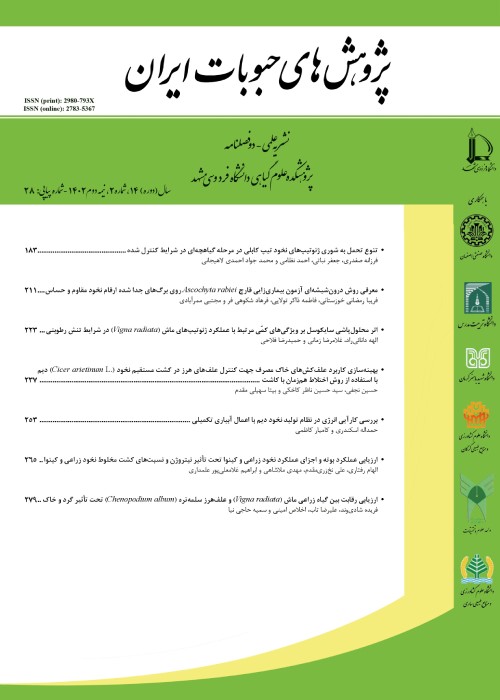Response of yield and yield components of six genotypes of Pinto beans (Phaseolus vulgaris L.) inoculation with Rhizobium phaseoli
Increasing the production of crops to meet the food needs of a growing population of the world is a great necessity. Intensive farming is an agricultural system that uses more than necessary and unbalanced inputs (fertilizers and pesticides), causing major of pressure on the environment. Today, in conventional farming systems, due to the limited amount of agricultural land, as well as the growing need for crops produced in indigenous agriculture, they have led to unbalanced consumption without the management of chemical fertilizers in the production of these products. The use of chemical fertilizer: nitrogen (N), phosphate (P2O5), potassium (K2O) in 2014-year ad around the world to 85.5, 32.2 and 20.4 (Kg of nutrients per ha) respectively. In comparison with year 2000 (Within 14 years), 64.9, 25.9 and 18.2 (Kg of nutrients per ha) respectively: 31.7, 28.1 and 12 percent it has increased. This undesirable agricultural management can change species composition or reduce biodiversity in farmland, and thus affect their natural capabilities in terms of crop production. On the other hand, increasing the health and security of food products produced in agricultural systems to maintain the dynamism of soil and water resources in these canopy systems is important on the basis of ecological principles. On the other hand, unbalanced consumption without management of chemical inputs has led to instability in agricultural ecosystems and the irreparable economic and environmental consequences of their consumption in agriculture are known throughout the world.
An experiment was conducted as factorial based on a randomized complete block design with three replications during growing season of 2017 at the experimental field of Beiranshahr city of Khorramabad in Lorestan Province, Iran (42° 79' E, 36° 70' N and 1669m above the sea level). To determine the physical and chemical properties of soil samples were collected from 0-30 cm depth of soil. During the experiment effects of two factors were studied: 1. Inoculation with Rhizobium bacteria Rb (Rhizobium Phaseoli Rb-133) in tow levels (Rb1= inoculation, Rb2= non-inoculation), and 2. different genotypes of pinto bean (Phaseolus vulgaris L.) in six levels (C1: Gafar, C2: Sadri, C3: Talash, C4: cos16 line, C5: Khomein Landrace and C6: Kosha genotypes). The seeds were inoculated with Rhizobium phaseoli Rb-133 before culturing. Traits such as: number of pods per plant, seeds per pod, number of seeds per plant, 100 seed weight, seed yield, biological yield and harvest index were measured.
The results showed the effect of rhizobium and genotype, number of seeds per pod, as well as the effect of two interactions rhizobium and genotype, number of pods per plant, number of seeds per plant, 100 seed weight, grain yield, biological yield and harvest index of pinto bean genotypes significantly increased. The effect of rhizobium and genotype had significant effects on number of seeds per pod (p≤0.01); effect of rhizobium and genotypeon number of pod per plant (p≤0.05), number of seed per plant (p≤0.01), 100 seed weight (p≤0.01), grain yield (p≤0.01), biological yield and harvest index (p≤0.01) had significant effects on pinto bean genotypes. Inoculation with Rhizobium seed yields of Ghafar, Sadri, Talash, Cos16 line, Khomein and Kosha 13.7, 37.2, 23, 20.9, 55.3 and 31.4 % increased, respectively. The highest grain yield (3485 Kg. ha-1) was obtained in the interaction between rhizobium and Sadri genotype.
Generally, results showed that the yield and yield components of pinto bean genotypes were influenced by Rhizobium bacteria (Rhizobium phaseoli Rb-133) inoculation. The inoculation of seeds with rhizobium bacteria, coexistence of beans along with the nutritional elements during growth stages of Pinto bean genotypes, could improve growth indices, increase yield and yield components. Inoculation with rhizobium has an increased effect on yield and yield components of pinto bean genotypes and can increase the grain yield to a favorable level in order to produce a stable product.
- حق عضویت دریافتی صرف حمایت از نشریات عضو و نگهداری، تکمیل و توسعه مگیران میشود.
- پرداخت حق اشتراک و دانلود مقالات اجازه بازنشر آن در سایر رسانههای چاپی و دیجیتال را به کاربر نمیدهد.


